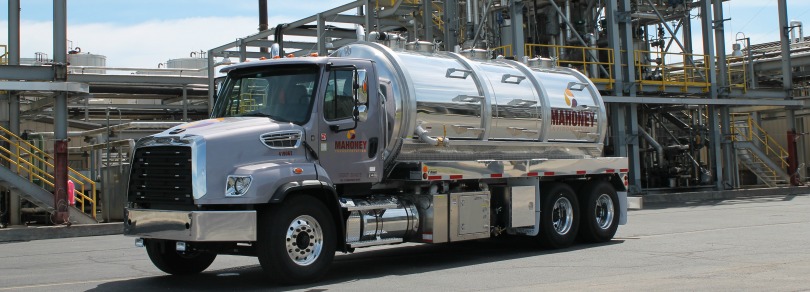© 2018 Renewable Energy Group, Inc. All Rights Reserved.
As a diesel technician with 15 years’ experience, Joe Siadak knows truck engines well. But biodiesel taught him something new.
When his employer, Mahoney Environmental, decided to run its fleet of Class 7 and 8 trucks on biodiesel blends, Siadak had some concerns. He thought his team would see more fuel system failures and increased filter change intervals.
The reality, however, is there’s been no impact on the performance of the 160-truck fleet, which collects used cooking oil from restaurants nationwide.
“It was very surprising that the failures and added work I expected to see just didn’t happen,” Siadak says. “It was as if we made no change at all.”
On board with biodiesel
His story is not unique. While some people make assumptions about biodiesel, the people who know diesel trucks best inside and out — mechanics and technicians— and have experience with biodiesel say their fleets run great on the renewable fuel.
“I’m 100 percent on board with biodiesel,” says Roger Ritchie, maintenance manager at Rochester Public Transit in Minnesota. “Our equipment has lasted and done a really good job.”
Rochester Public Transit has been running its buses on biodiesel blends for nearly 20 years. It started at a B2 blend, meaning the fuel is 2 percent biodiesel and 98 percent petroleum diesel, and gradually moved to higher blends. Today, the 55-bus fleet uses B20 in warmer months and B10 in the winter.
“With the B10 in the winter, we haven’t had any issues at all,” says Ritchie, a diesel technician for nearly 40 years. “We change filters every 6,000 miles, and the equipment has run fine.”
Fewer maintenance issues
One of the benefits of biodiesel is it adds lubricity that is lacking in ULSD. Diesel vehicles rely on fuel to lubricate the fuel injection system, including the fuel pump and injectors. Without enough lubrication, these components can experience unnecessary wear and damage. Proper lubricity management can also help engines run smoother, more quietly and cooler.
“While we do not tear down injectors to see the impact firsthand, our injector replacement certainly has decreased since we started running on biodiesel,” Siadak says. “I attribute this to the increase in lubricity the biodiesel provides.”
Rochester Public Transit also has had fewer injector issues since moving up to B20 a few years ago, according to Ritchie.
Biodiesel also has a higher ASTM spec for Cetane compared with petroleum diesel. And Siadak says biodiesel’s cleaner burn has contributed to fewer after-treatment failures from plugged diesel particulate filters.
A good solution
There are other benefits to fleets that use biodiesel. One is that biodiesel reduces greenhouse gas and engine head emissions compared with petroleum diesel. Another is that biodiesel is often cheaper than petroleum diesel.
What Siadak and Ritchie are ultimately responsible for is keeping their fleets in peak condition. And in that respect, biodiesel gets the job done.
“I’ve been working on Rochester buses since the mid-1980s, and biodiesel has been as good if not better for the equipment than diesel,” Ritchie says.
And Siadak says anyone who thinks biodiesel hurts performance should look under the hood.
“If two trucks were side by side and one ran biodiesel and one didn’t, you would not be able to tell the difference,” he says.

Looking Under the Hood
at Biodiesel





